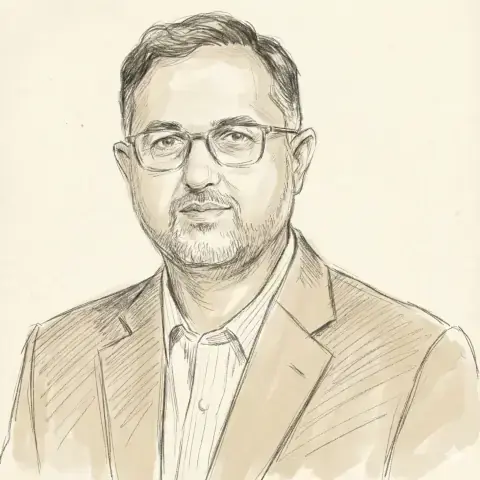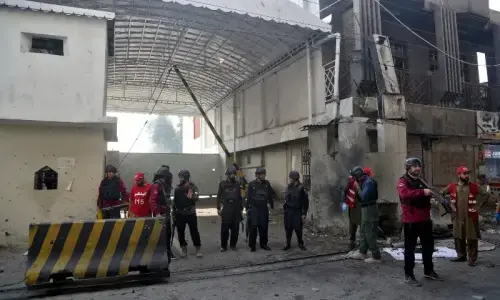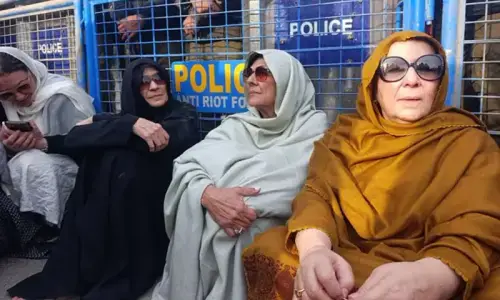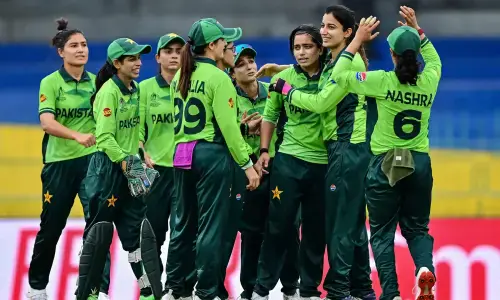ISLAMABAD: Country’s top military brass looked on Friday satisfied with the outcome of steps taken by Pakistan to aid reconciliation in Afghanistan and endorsed continuation of the support for the process.
“Backing of the peace process in Afghanistan should go on. Pakistan would be the main beneficiary,” one of participants of the 155th Corps Commanders Conference told Dawn after the meeting that was described by military’s public affairs wing — ISPR — as a routine monthly affair that reviewed professional matters and was “briefed about internal and external security situation of the country.”
The meeting at the General Headquarters was chaired by Chief of Army Staff Gen Ashfaq Parvez Kayani.
The decision to continue assisting the Afghans came ahead of Pakistan-Afghanistan-Turkey trilateral summit in Ankara next week (Dec 11-12) and at a time when Acting US Special Envoy for Afghanistan and Pakistan Ambassador David Pearce was visiting Islamabad and holding meetings with Pakistani officials.
It’s an open secret that the generals run the foreign policy of the country and more particularly the policy towards the US, Afghanistan and India. Therefore, analysts believe that endorsement of the policy to encourage peace process in Afghanistan would imply sustained Pakistani support for it.
Pakistan had last month, during the visit of High Peace Council, moved beyond its traditional reiteration of support for reconciliation when it released a batch of mid-ranking Taliban primarily to test waters.
Later, Islamabad agreed to free more Taliban prisoners from its custody and facilitate contacts between the Peace Council and the militants.
The government has maintained a thick shroud of secrecy around the identity of the released prisoners on the pretext of the personal security of the freed men although the media has speculated several names. Therefore, it is difficult to independently verify how successful has been Pakistan’s strategy.
Major international players in Afghanistan, including the US and Iran, have welcomed Pakistan’s move to set free Taliban prisoners.
The corps commanders were informed that the policy on Afghanistan enjoys “across the board support” in the country because of the realisation that peace inside Pakistan hinged on peace in Afghanistan.
Replying to a question about the next big steps by Pakistan for assisting the process, the senior official said “for the moment meetings are taking place and that is encouraging.” He wouldn’t explain what was being discussed in those meetings or what the basis of his optimism was.
Involving Pakistan’s clergy that has a strong following among the Taliban was one of the steps that have lately been agreed. An ulema (clerics) conference is being planned for last week of January in Afghanistan, where the religious leadership would urge the militants to renounce violence and join peace efforts.
LAW, ORDER: The corps commanders also took stock of the law and order situation.
Sudden spike in sectarian and political violence has engulfed the country with Karachi and Quetta being the worst hit.
A spate of sectarian attacks started during first 10 days of Muharram, the first month of Islamic calendar.
Eighty persons were killed in November because of their sectarian affiliation.
In the context of corps commanders discussing the issue, the senior official said it was for the civilian law-enforcement agencies to address the issue.
It was up to the government to ask the army to assist the civilian LEAs, he said adding the military always does its contingency planning.
































